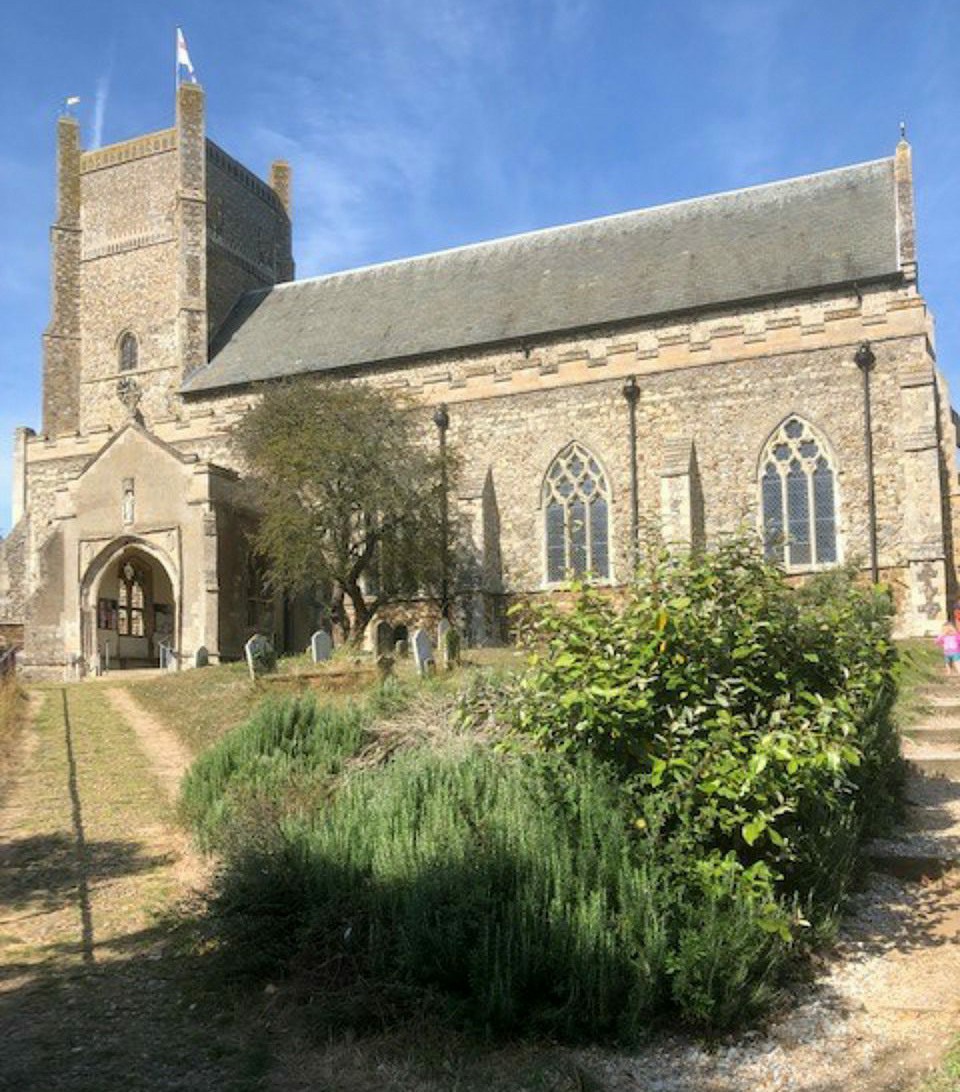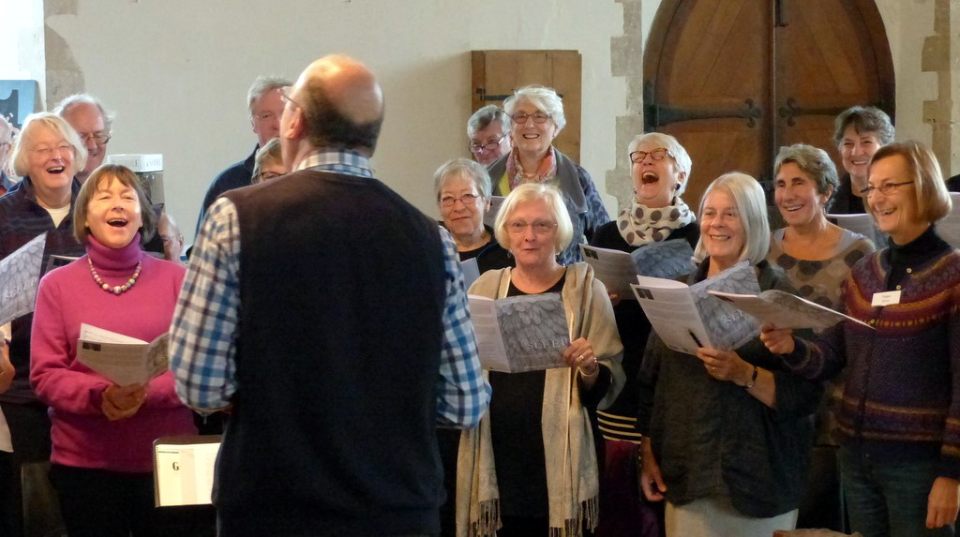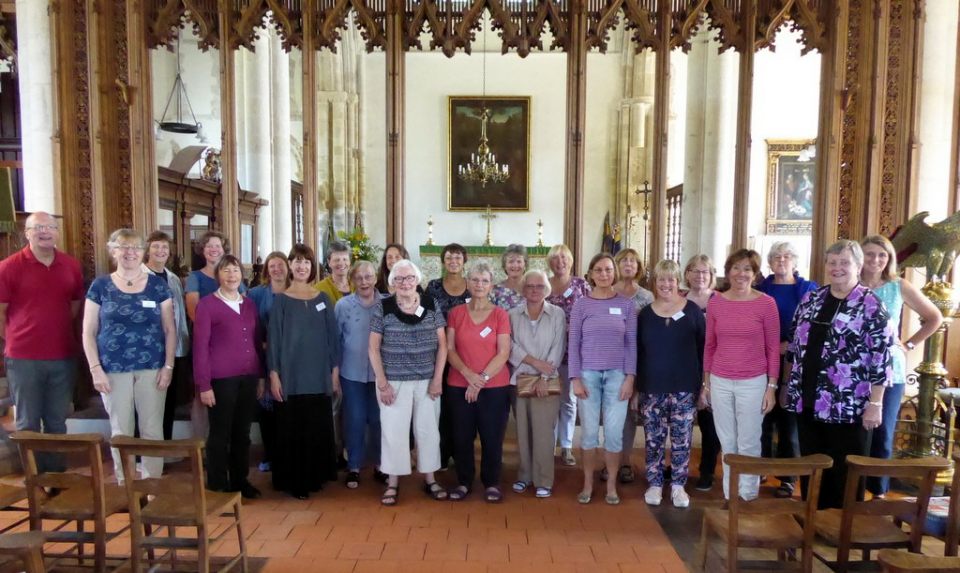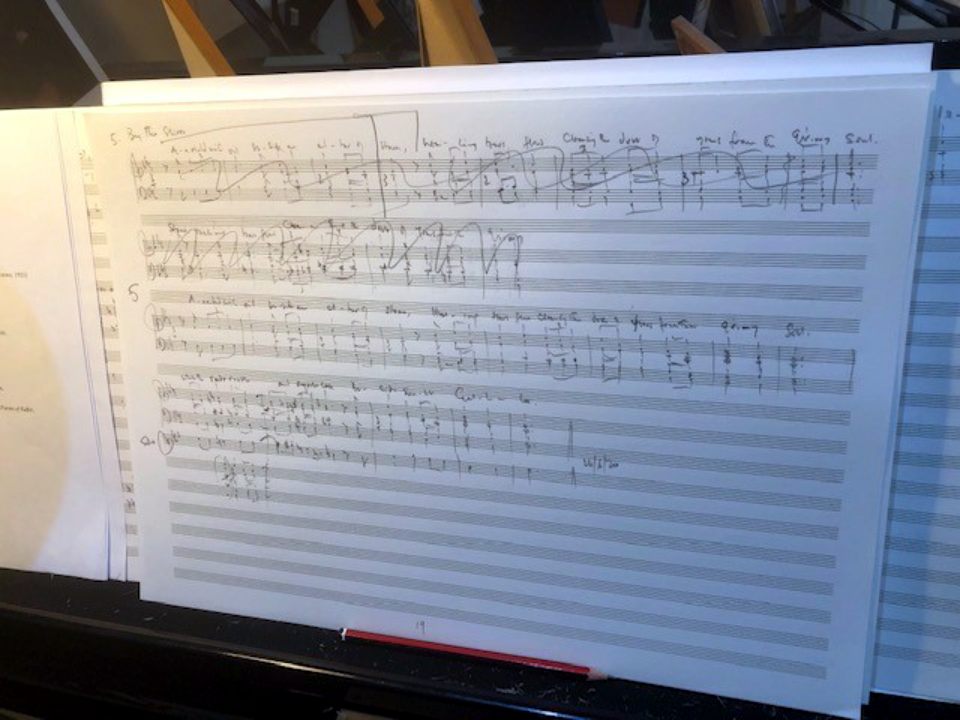
Parkside, Burnthill Lane, Rugeley, Staffordshire WS15 2HX
Tel: +44(0)1889 801929
Mob: +44(0)7866 770360
E-mail: ece@paulspicer.com
Website: www.englishchoralexperience.co.uk
NEWSLETTER No.2
7 July 2020
Dear Friends
I want to keep regularly in touch with you all partly to keep you up to date with the latest news but also to just keep something music-related falling into your inbox (which probably already has lots!) and to keep ECE in your minds in the knowledge that we will be back together sometime either later in the year or in 2021.
The first bit of sad news is that I have just today cancelled the Orford Upper Voices Camerata weekend in mid-September. The obstacles we faced were insurmountable. I have already asked for the weekend of 18/19 September next year to be reserved for us and hope that this will be confirmed by the church soon. We will keep the same repertoire. If there were to be the possibility of finding a weekend earlier in the year I might follow that up, but given current uncertainties it might well be best to simply postpone by a year. It is deeply disappointing as not only are these upper voices weekends fun, but the place is so beautiful to visit and the musical associations with Britten and Pears so strong, but the sea air is also invigorating.
I am taking each course as it comes. Thus, Gregynog in October is still live although their website tells us that they are currently closed until further notice. I have written to them asking if they have any further information that they can share with us. The problem as we all know is that the advice about singing is full of uncertainties and contradictions. Barbara Hathaway, from the Birmingham Bach Choir, who many of you will know from our courses, has very kindly put together this helpful information gathering much of the current thought into one document.
 St. Bartholomew’s Church, Orford
St. Bartholomew’s Church, Orford
 A happy group! (photo by Monica Darnbrough)
A happy group! (photo by Monica Darnbrough)
 The 2019 Orford group (photo by Monica Darnbrough)
The 2019 Orford group (photo by Monica Darnbrough)
France 2020
It was agreed at a recent committee meeting (via Zoom) that in this newsletter I should canvas opinion about next Easter’s French week. It is my current intention to book Chateau Rieutort again but it did occur to us that there may still be concerns about travel even by that stage. So I wonder if those who are considering coming to France next year (7-14 April) would contact me to say if they have travel concerns. It would be interesting to know if people would prefer a location further north in France – or even Holland or Germany. Would this make a difference if we could actually find a venue with sufficient suitable accommodation etc? Contact details are at the head of this letter.
COVID-19 and Singing (gathered by Barbara Hathaway)
Singing – natural and instinctive, something common to people from all cultures from cradle to grave, which has proven physical, mental and social benefits when done with others – is suddenly the villain of the piece, thanks to coronavirus. In the UK, communal singing is banned in churches, and prohibited in the latest guidance for schools, while a total of six singers at 3 metre spacing has been cited in various places as the current limit implied by current guidelines (as BBC item of 29 June with singers from Wells Cathedral).
Dramatic rates of infection following some choir rehearsals (including two in Birmingham) have led to either complete bans as in the UK, or, elsewhere in Europe, major restrictions on rehearsal practices. As yet, though, the full reasons for choir infections are not clear. Socialising, closely packed seating and sharing are blamed by some but don’t explain everything (and there are as many views as there are experts), while current guidance on safe distancing is based on long-standing advice relating to colds and flu. Research outside the UK, relating to air movement associated with various musical instruments and also singing, has been starting to inform guidance on rehearsal and performance (eg the Freiburg Institute guidance), while primarily medical research into the infectious aerosols produced copiously (alongside the better-understood droplets) by speaking and singing is progressing. Opinions vary, but the ability of aerosols containing Covid 19 to remain airborne and infectious for several hours after production seems likely to be another factor possibly relevant to choral transmission.
Although various sets of rules for choral rehearsal have been proposed, or are in use, in other European countries, they vary widely from country to country (see Guidelines and Recommendations section in European Choral Association document below) and all have considerable practical drawbacks regarding space requirements, duration of rehearsal periods and ventilation. In reality, too, it is not known which, if any, of these guidelines would actually prevent a contagious individual from infecting another singer…
So far in the UK there has not been any specific singing-related research; live performance has all but ceased until further notice, and choral singing the same. However, after extensive lobbying from various quarters, a government green light is understood to have been given to research in the hope of finding a way forward for singing of all kinds. We must hope that a full picture emerges of how infection occurs in choral settings, and that it leads to safe ways of singing for everyone – as well, of course, as the vaccine.
Some good sources of material:
VirMus.nl – . https://www.virmus.nl/ - an excellent Dutch website which offers (in English) “science-based information on what is known and what is unknown about the risks of spreading the virus called SARS-CoV-2, or simply coronavirus, in music making situations”. The literature page is fascinating.
Freiburg Hochschule fur Musik Risk Assessment and guidance: https://www.mh-freiburg.de/en/university/covid-19-corona/risk-assessment
European Choral Association compendium: https://docs.google.com/document/d/1QHhJbirrbPWQ6CFxbj-uy_3QwjNvXlPptchFvVoLlHg/edit#
Onwards
I am very much hoping that our Telemann and Schütz weekend in Winchester will also go ahead and I will be in touch about both this and Gregynog as soon as I have any news.
My current activities etc
My time is being spent writing my book about Arthur Bliss and finally coming to the conclusion that he is a remarkable composer after all! I have been rather agnostic about his music and there is a fair amount which I still find difficult to warm to. But the period I am working on at the moment – the 1930s – has some truly outstanding works, especially Morning Heroes, the Clarinet Quintet, Viola Sonata and the remarkable music for H G Wells’s film Things to Come which many still think is one of the greatest film scores ever written. So all this is absorbing and I am fascinated by his growing maturity and changing style from original enfant terrible to someone with a far more romantic voice!
Then I am composing (normally making a two week period on writing and the next two on composing) and of course I have the wonderful ECE commission to fulfil. Here is work in progress!
You can see below how much gets crossed out! I have found this short movement particularly difficult. It is amazing how sleeping on a problem normally sees a solution to it the next morning. The subconscious works overtime whilst asleep!

I sent out information about the libretto of the commission in my thank you letter to all who supported the fund. But I thought you might like to see the actual texts which I think make a wonderful collection for such a composition. The idea, you may remember, is that it is intended to be performed complete at Abbey Dore next year but that one movement should be exportable to other courses so more people can feel part of it. Here is the selection of texts:
English Choral Experience Commission 2020/2021
Music touches the very quick of sense
And moves us to a sudden penitence,
Breaking the floodgates of the sullen heart.
Its secret, sought and lost and sought again,
Woven of wind in elms and summer rain,
Holds the unnoticed silences apart.
With brilliance of blessing, stars and dew,
Evening woven of sound o’ershadows you,
And, with a cadence turning unto night,
Spares not the sweetness of a parting note,
But falls in forests solemn and remote,
Trembling to stillness, quiet with delight.
(Music at Night, Ian Davie from Piers Prodigal)
In the hour of my distress,
When temptations me oppress,
And when I my sins confess,
Sweet Spirit comfort me!
When I lie within my bed,
Sick in heart and sick in head,
And with doubts discomforted,
Sweet Spirit comfort me!
When the tapers now burn blue,
And the comforters are few,
And that number more than true,
Sweet Spirit comfort me!
When the Judgement is reveal’d,
And that open’d which was seal’d,
When to Thee I have appeal’d;
Sweet Spirit, comfort me!
(In the Hour of My Distress, Robert Herrick)
The earth is sweet with roses,
And rich with marigold,
And violets and crocus
Are wet with running streams…
And through the grassy meadows,
The blessed spirits go,
Their white feet shod with lilies,
And as they go they sing.
(Easter Eve, Prudentius 348-c.410, trans. Helen Waddell)
leading to:
Such flowers as Earth our Mother
Scattered on Ida’s top,
When Jove himself desired her,
Her sweetness yielded up.
Then swayed the flow’ry rushes
And crimson flamed the rose …
This is the earth for Beauty,
Deep lying in the grass.
The day grew bright above them,
And watched their pleasure pass.
(Petronius Arbiter AD20-66, trans. Helen Waddell)
Some lives’ labours bear but a few tears;
others bequeath heady springs and streams –
yet all give light unto the dark world.
Their suffusing streams wind and entwine,
Forever forging rivers through the
Lightening darkness, running to seas,
oceans of eternal thought, ever
rejuvenating, living beyond
the time of these begetters of light –
The Lights of the World. Earth exalted
through Man, and Man exalted through Earth.
Without either can there be Beauty.
(Philip Lancaster: extract from Lux Mundi, part of Fulcrum – a fall of leaves)
Joyously return again
Singing birds in chorus,
Spring is in our ways again,
New delight before us.
O youth, be gay!
Green is on every spray,
And April, sweet of breath,
The old earth garnisheth.
Sluggish winter far away
Clearer skies have driven
Higher swings the summer sun
In the arch of heaven.
Gone is the time,
And come the warmer clime.
And even so
Love in our hearts again
Kindles the ancient flame.
Basking are the Dryads
In the forest rides,
Wander the Oreads
On the hillsides,
Satyrs dancing,
Through lovely Tempe chanting,
And through the rout,
Sings Philomel, remembering
The gladness of an older spring.
Then let us praise together
This earth that is new-stirred,
And happy be the lover
Who knows his prayer is heard,
By grace of Her
Whose altars fragrant are
With flowers new blown.
And God have pity on the sadder folk,
Who travail without hope!
(Part of a Latin poem in a manuscript of Benedictbeuern Abbey, Germany, founded in 739, translated by Helen Waddell)
The other big event in our lives here is the very recent arrival of our new puppy. He is a Parson Russell Terrier called Allegro non Troppo (!) – Rei’s inspired choice of name for him – called Troppo. Rather a life-changing moment, but hopefully a very happy one, and a good moment to get him trained whilst we are housebound for so long.

 The last newsletter ended with a photo of me being relaxed. This one is reminding me of the visceral act of conducting! (photo by Monica Darnbrough)
The last newsletter ended with a photo of me being relaxed. This one is reminding me of the visceral act of conducting! (photo by Monica Darnbrough)
I hope you are all keeping safe and well. There was good news for the Arts World from the Chancellor today. Let’s hope it makes a difference for the music world.